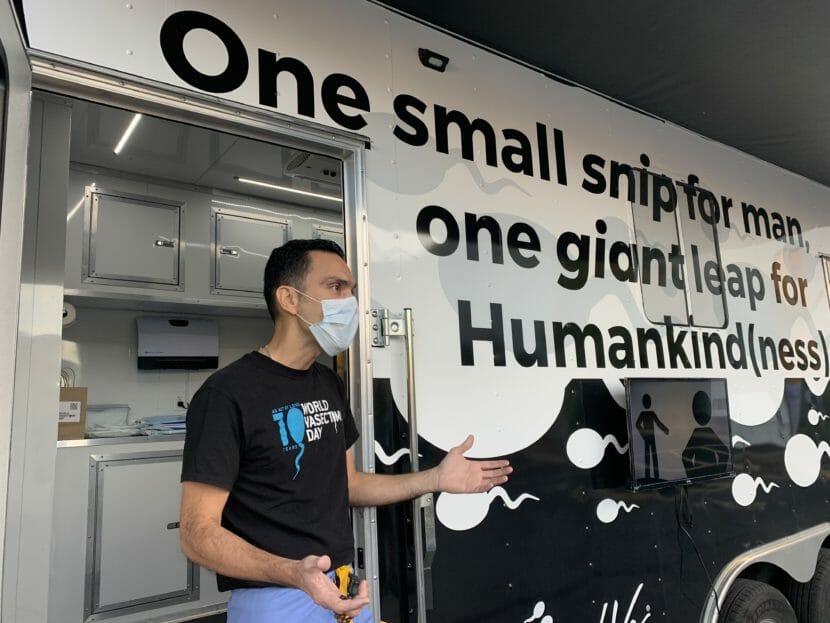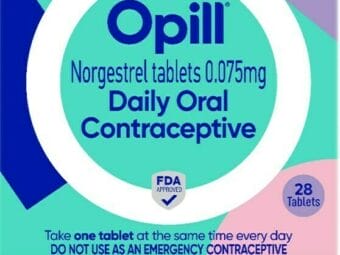
Restrictions on abortion in many states are prompting some men to rethink their reproductive health decisions. Since this summer’s U.S. Supreme Court ruling overturning Roe v. Wade, some doctors say they’re hearing from a growing number of male patients asking for vasectomies.
“It shouldn’t just be on women to step up and not have kids, you know?” says Dustin May, of St. Louis, shortly after his vasectomy procedure at a Planned Parenthood clinic. Vasectomies are outpatient permanent sterilization procedures that block sperm from being released in semen.
May and his girlfriend, Courtney Price, have known for years that they don’t want children.
“If she got pregnant, an abortion would be something that we would consider,” he said. “This is a step to prevent that.”
Price says she’s tried several types of birth control, all with unpleasant side effects. May and Price are both still in their 20’s, but Price says they knew from their first date more than three years ago that neither one of them wanted to become parents.
“I’m like, ‘Kids?’ And he’s like, ‘No.’ I’m like, ‘Thank God!’ ”
Few other options in restrictive abortion states
As of the Dobbs v. Jackson Women’s Health decision in June, abortion is illegal in Missouri and roughly a dozen other states, with Republican lawmakers in many states pushing to pass more restrictions in the future.
The Planned Parenthood clinic in St. Louis used to provide abortions, but on a recent day NPR visited, the health center was hosting a free vasectomy clinic at three different locations around Missouri over three days. Normally, if not covered by a patient’s insurance, Planned Parenthood charges up to $1,000 for the procedure, including follow-up care.
As soon as the Dobbs decision was released, Dr. Esgar Guarín says his Iowa-based vasectomy practice saw a surge in website traffic, and the number of patients coming for procedures nearly doubled from June to July.
“What has happened is that since Roe v. Wade was overturned, many men have realized that they perhaps have been absent in contraception, particularly in contraceptive decisions,” says Guarín, who assisted with the vasectomy clinic in Missouri.
Guarín’s practice isn’t alone. A spokesperson for the American Urological Association told NPR that while national data isn’t available yet, healthcare providers around the country have anecdotally reported seeing increased demand for vasectomies in recent months.
Permanent with little risk

In addition to being permanent, Guarín says vasectomies are relatively quick – about 10 minutes for a skilled surgeon. They’re also less invasive than tubal ligation, a sterilization procedure that involves cutting or blocking the fallopian tubes to prevent pregnancy. They have a far lower failure rate than many other types of birth control including condoms and are more effective than some other types of contraceptives including the pill.
Dr. Sarah Vij, assistant professor of urology at the Cleveland Clinic, says vasectomies are “at sky-high, record rates” since Dobbs. At Planned Parenthood North Central States in the Midwest, CEO Ruth Richardson says the organization received a “surge of calls” after the decision.
In New York, Dr. Meera Shah, chief medical officer at Planned Parenthood Hudson Peconic, is getting similar calls from patients who’ve decided that now is the time for a vasectomy.
“They’ve been thinking about getting it for a really long time, and then what’s happening in this country has motivated them that much more to get the vasectomy,” Shah says.
Some downsides
There can be downsides, though. Shah tells patients that vasectomy reversals are sometimes possible but never guaranteed.
“If somebody is going into a vasectomy saying, ‘Oh, it can be reversed,’ then I say that they may not be a candidate for it.”
Shah says some patients choose to freeze their sperm before the procedure in an effort to keep more options open should they decide to try to have a child in the future.
Another patient at the Planned Parenthood in St. Louis, Collin Mack, says he’s been wanting a vasectomy for several years, “but I waited because I don’t like making rash decisions.”
Now, Mack says he worries about the lack of access to abortion. And he likes the idea of being in control of his fertility, rather than relying on a female partner’s contraceptive decisions.
At 24, Mack says he felt confident in his decision, but he persuaded his grandparents to help fund the cost of freezing some sperm as a “backup option” in case he ever changes his mind. Storing sperm typically costs several hundred dollars a year.
“I kind of played the card of like, ‘Do you guys want me to have kids? Because you guys seem the most upset about this procedure, you guys should invest some money in me freezing the sperm,'” Mack says. “I’m not too worried about it. I’d prefer not to have kids – I think that’s the choice that I’m going to stick with.”
Dr. Guarín says many of his recent patients have been younger men, often in their 30s, as well as couples. Many had been relying on female partners for contraception and no longer feel confident doing so.
“I hope this is an inflection point in reproductive rights in America for the participation of men,” he says.
Copyright 2022 NPR. To see more, visit https://www.npr.org.9(MDEwMjQ0ODM1MDEzNDk4MTEzNjU3NTRhYg004))



